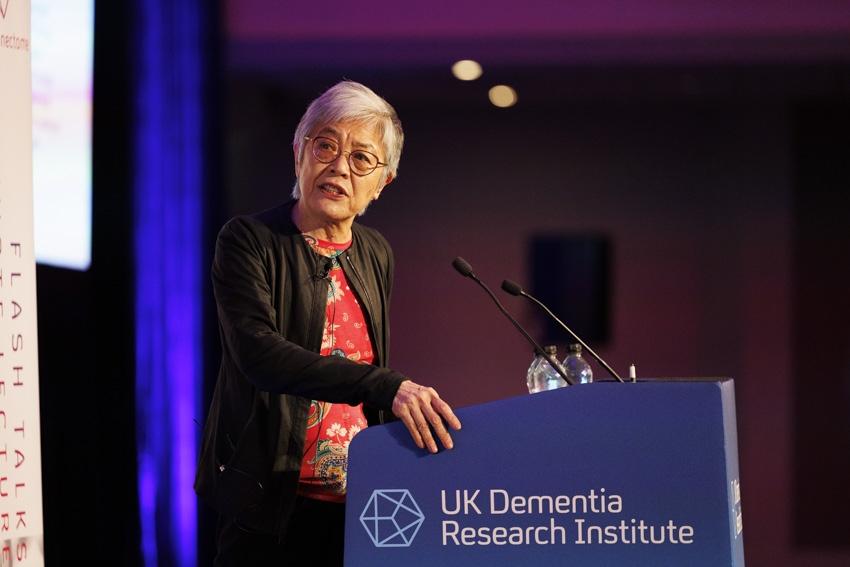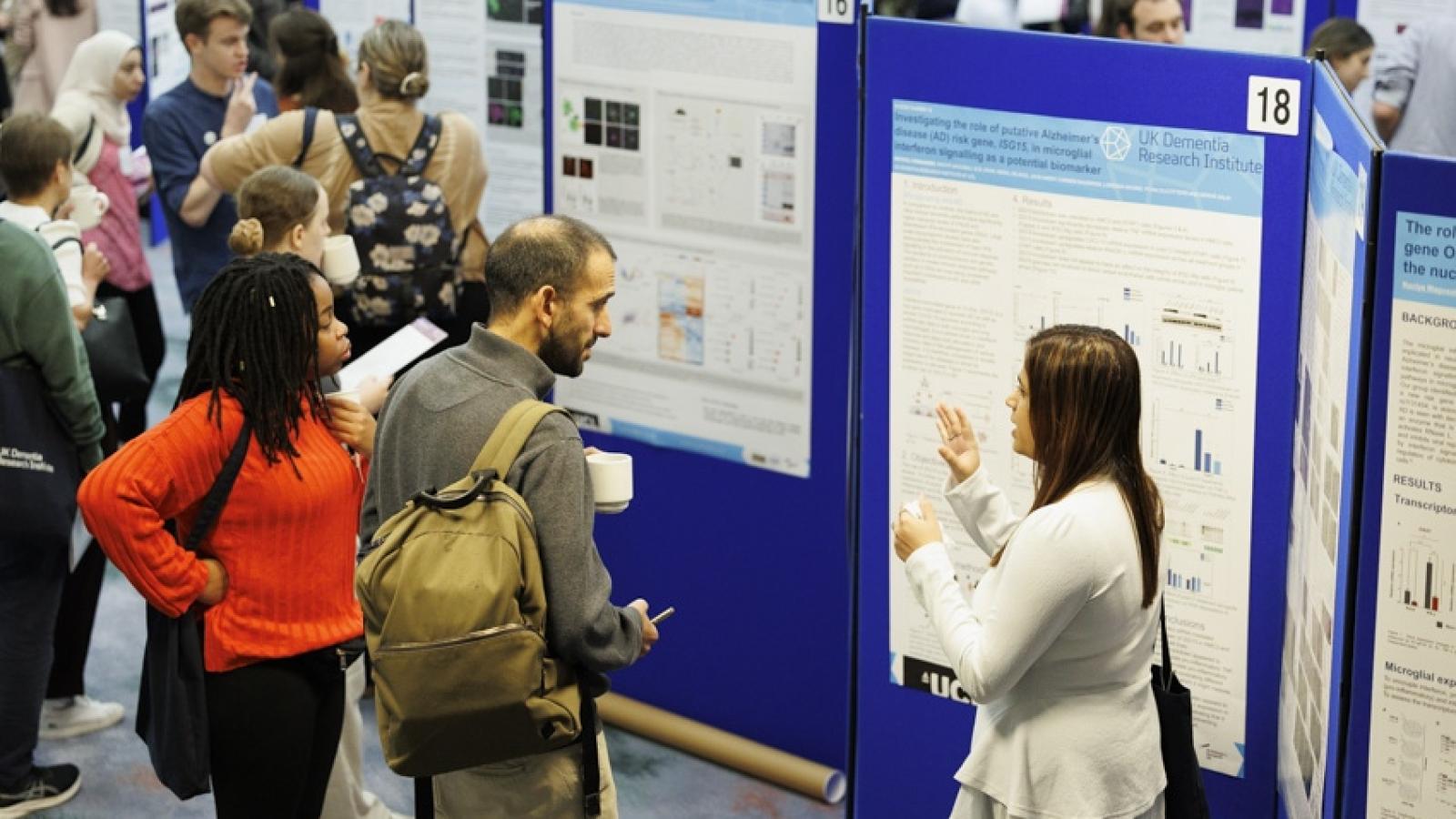It’s been another fantastic year for the UK DRI, with exciting partnerships, new faces joining the Institute and plenty of important scientific discoveries. Read on to explore some of our highlights from 2023.
Major funding sets us on track for next phase
The year was off to a strong start, with a major funding boost. As a result of a score of ‘excellent’ in our first major review, our principal funder the Medical Research Council (MRC) committed £131 million in funding. This forms part of a collective commitment with our other founding funders, Alzheimer's Society and Alzheimer's Research UK, of £150 million for the next five years. The new funding stands us in great stead to continue to drive forward an ambitious agenda of research, building on our early successes.
Joining forces to accelerate our efforts
We were thrilled to announce a partnership with the British Heart Foundation (BHF), to establish the UK’s first research centre dedicated to vascular dementia. The search for a Director to head up the Centre is now underway. In other news, we joined forces with pharmaceutical company SPARC in a new strategic partnership, and Lilly committed further funds towards our ongoing partnership. Our partnership with LifeArc reached an exciting milestone as £14.5 million was allocated to support seven innovative projects seeking to develop new tests, treatments and medical devices for the more than one million people in the UK living with neurodegenerative conditions.
Welcoming fresh faces
This year, we welcomed many new starters to the Institute. Prof Siddharthan Chandran was appointed as Director of the UK DRI, and Prof Mina Ryten joined as Centre Director of the UK DRI at Cambridge. Elsewhere around the Institute, five new Group Leaders came on board, including Dr Tom Massey (UK DRI at Cardiff) and Dr Andrea Serio (UK DRI at King’s). Former UK DRI Emerging Leader Dr Sarah Marzi began a new role as a Group Leader at the UK DRI at King’s, and four more Emerging Leaders joined the programme.
Scientific discoveries propelling progress
UK DRI researchers continued to produce vital, high quality discovery research. This year, several important papers were published, including a study that found smart watches could identify Parkinson’s up to seven years before clinical diagnosis, a non-invasive brain stimulation technique to treat neurodegenerative diseases reported its first human results, a study about immune response to viral infection accelerating Alzheimer’s progression, clues as to how neurons die in Alzheimer’s, and many, many more.
Knowledge exchange and networking
Our researchers took part in many important scientific events this year, including three held by the CURE-ND alliance: a clinical workshop, an ECR meeting and a symposium at the British Neuroscience Association’s Festival of Neuroscience. Our early career researchers spearheaded several events across our research themes, including a Vascular Theme workshop in Edinburgh.
Together with the Neuroscience School of Advanced Studies, we held a joint workshop on Neuroinflammation and Neurodegeneration which attracted researchers across all career stages from Europe, USA and Asia and a stellar teaching faculty from UK DRI, VIB, Harvard, UCLA, Amsterdam UMC and Singapore A*STAR. One attendee called it “one of the best courses I have been to”.
Making research matter to more people
Across the Institute, our scientists are working to engage the public in research – whether through outreach events or participating in studies, click here to discover just some of these important initiatives. At our Centre for Care Research & Technology, a new network launched, spearheaded by Public Involvement Lead Sophie Horrocks. ‘Friends of CR&T’ aims to create a community of researchers, clinicians, and people with lived experience, where all can learn from one another.
Policy and influencing
The UK DRI at Cardiff opened its doors for an exciting showcase event this year, inviting policy makers and stakeholders to come and see inside its cutting-edge labs. Elsewhere, Dr Amanda Heslegrave (UK DRI at UCL) took part in the Royal Society’s Pairing Scheme and shadowed a civil servant for a week. We welcomed the Minister for Health and Secondary Care, Andrew Stephenson CBE MP, to visit the UK DRI Centre for Care Research and Technology, and Former Science Minister George Freeman MP attended a dinner with the UK DRI Trustees.
Recognising excellence
Huge congratulations to all those who won awards and accolades this year, including all the recipients of our annual UK DRI Recognition Prizes. In other news, Dr Soyon Hong (UK DRI at UCL) was awarded the Alzheimer’s Research UK David Hague award for Early Career Investigator of the Year, Prof Joanna Wardlaw (UK DRI at Edinburgh) received the prestigious 2024 Biochemical Society Award for Sustained Excellence, and Prof Sir John Hardy (UK DRI at UCL) was elected as a Foreign Member of the Chinese Academy of Sciences.

gave a fantastic keynote speech at Connectome
Coming together for Connectome
Over 600 researchers from across our seven Centres travelled to Brighton for our annual conference, Connectome, in October. At the conference, Prof Siddharthan Chandran addressed the Institute as Director for the first time, setting out his goals and vision. The event was a great success, packed full of exciting scientific talks including fantastic keynote speeches from Dr Virginia Lee and Prof Tony Weiss Coray, and plenty of opportunities to make new connections.
More positive news for people affected by Alzheimer’s
Lastly, following on from the excitement of new Alzheimer’s drug lecanemab last year, 2023 saw more positive news. In January, lecanemab was granted accelerated approval by the FDA, and it was fully approved in July. In May, the pharmaceutical company Eli Lilly announced positive results from its phase 3 clinical trial of donanemab for the treatment of Alzheimer's disease. Lilly reported that the drug slowed cognitive decline by 35% compared to a placebo, in people with early symptomatic Alzheimer’s.
The UK DRI has gone from strength to strength this year, thanks to the brilliant work of all our members. Here’s to even more successes in 2024!
Article published: 13 December 2023
Image credits: © KU Leuven - Geert Vanden Wijngaert, UK DRI Ltd
